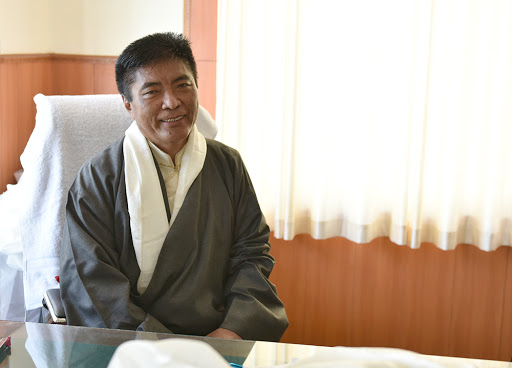Tibetans in exile gearing up for Presidential and Parliamentary Election
The world’s most successful
refugee organisation will soon hit the road for elections to the 16th Kashag (Cabinet) and 17th Droetsok (Parliament).
The appointment of two additional election commissioners Geshema (Ph.D) Delek
Wangmo and former MP Sonam Gyaltsen hinted at the soon-to-be beginning of an
exile's largest election. Two additional commissioners will be assisting the
Chief Election Commissioner Wangdue Tsering in the 2020-2021 election. Election
Commission is the CTA’s autonomous body that is entrusted with the
responsibility of holding the exile’s election under the CTA's jurisdiction.
According to reports from Central Tibetan Administration and other exile- based media, the two additional election commissioners have taken oath of office from the Chief Justice Commissioner after being elected unanimously by the standing committee of the Tibetan Parliament in exile, who meets in the absence of the parliamentary session. Amongst the attendees to the oath taking ceremony are Sikyong (President) Dr Lobsang Sangay, Speaker of Tibetan Parliament-in-Exile, Deputy Speaker, Justice Commissioners, Kalons (Ministers), heads of the Autonomous bodies and members, and secretaries of CTA. Meanwhile, for the electorate of Australiasia, the Chief Representative of the Tibetan Information Office, Lhakpa Tsokho shall be the chief regional election commissioner.
 |
| Regional Chief Election Commissioner for Australiasia, Lhakpa Tsokho |
The
term of present Sikyong (President) and Parliament (ATPD) ends in mid May and
elections for both the post filled by then. According to the Charter of
CTA, the adult franchise is set at over 18 years of age, the age qualification
for standing in the election for Parliament is 25, while for President it has
been set over 35 years of age.
The
Charter describes Tibetan democracy as 'party-less democracy' and
recently even banned for the first time exile-based Tibetan NGOs and
community associations from endorsing any candidate in the recent
amendment to the election rules and regulations.
The
CTA conducts two rounds of election for both the post of President (Sikyong)
and Parliament with an amendment to the post of president where if any
candidate secures more than 60% in the primary, he/she is declared elected without requiring to
face second round or run-off. The election process is quite similar to Mongolia,
Brazil and France with slight difference.
The
Tibetan refugees are highly systematised and organised organisation. It
conducted similar election from Dharamsala headquarter in 2015-2016 that had
voters from over 23 countries including North America, Europe, India, Nepal and
Australia. This year Tibetans in over more than 25 countries around the world
will take part in the electoral process. Nearly 70,000-90,000 people could
qualify by age to exercise adult franchise out of approximately
total population of 150,000 Tibetans in exile diaspora.
The
biggest victory of Tibetans over Chinese Communist government is the
introduction of democracy in exile to which Tibetans call a 'blessing from His
Holiness'. While 1.4 billion Chinese couldn't partake in democracy with more than 5
million Tibetans remaining without political rights and adult franchise to
exercise in de facto, Tibetans in exile have been exercising their democratic
political rights for over 60 decades cutting across more than dozen countries
around the world to elect a leader to be running the exile organisation from
the small hill of Dharamsala. His Holiness the 14th Dalai
Lama is considered the father of Tibetan democracy who gifted the political
power to his people despite returning the authority back several times.
September 2 is celebrated as the Tibetan Democracy Day all over the world.
 |
| Additional Election Commissioner, Ex-MP Sonam Gyaltsen |
 |
| Additional Election Commissioner, Geshema (Ph.D) Delek Wangmo |
 |
| Chief Election Commissioner, Wangdue Tsering Pesur |




Comments
Post a Comment